Editorial Board
Editor-in-Chief
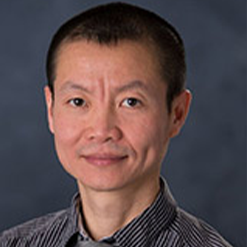
Email: [email protected]
Research Interests:Intelligent Vehicles, Unmanned Aerial Vehicles, Unmanned Ground Vehicles, Autonomous Underwater Vehicles, Motion Planning, Simultaneous Localization And Mapping (SLAM), Mechatronics, Control Systems, Robotics, Multi-agent Systems, Artificial Intelligence
Short Bio: Howard Li (PhD, IEEE Senior Member) is a professor in the Department of Electrical and Computer Engineering, University of New Brunswick, Canada. He is a registered professional engineer in the Province of Ontario. He obtained his Ph.D. in Electrical and Computer Engineering and the Certificate in University Teaching from the University of Waterloo, Ontario. He received his certificate in Team Based Project Management from the School of Business, Queen’s University, Kingston, Ontario. He obtained his bachelor's degree in Electrical Engineering from Zhejiang University, China. Dr. Li is a board member of the IEEE SA Standards Board. He chairs the IEEE Charles Proteus Steinmetz Award committee, one of the highest technical recognitions given by the Institute of Electrical and Electronics Engineers professional society. He is honoured to chair the first autonomous robotics standard ever published by the IEEE, with over 100 group members from academia, industry, and government agencies from all continents. Dr. Li is a visiting professor of École Polytechnique Fédérale de Lausanne, Switzerland and Università di Pavia, Italy, etc. Before joining UNB, he was employed by Atlantis Systems International in the development of training systems for the F/A-18 Hornet fighter aircraft for the Boeing company, Canadian Forces, Royal Australian Air Force, and training systems for the Royal Danish Air Force. He has developed software and hardware for both civilian and military applications.
Dr. Li’s research interests are UxVs (unmanned aerial vehicles, unmanned ground vehicles, unmanned underwater vehicles), motion planning, Simultaneous Localization And Mapping (SLAM), mechatronics, control systems, robotics, multi-agent systems, and artificial intelligence. He had the honour to deliver numerous plenary speeches with respected leaders, such as Professor Michael Jordan, Professor Stanley Osher, President of Unmanned Systems International, President of ICAO, Chairman of DJI, VP of JD.com, Inc. He regularly assesses grant applications for premier funding agencies, such as Canada Research Chairs, Natural Sciences and Engineering Research Council of Canada (NSERC), Swiss National Science Foundation, and Israeli Ministry of Science, etc. He has secured research grants from premier funding agencies, such as Natural Sciences and Engineering Research Council of Canada, Canada Foundation for Innovation, Defence Research and Development Canada (Medicine Hat, Alberta; Ottawa, Ontario; Halifax, Nova Scotia), Foreign Affairs and International Trade Canada, New Brunswick Innovation Foundation. Dr. Li has published articles in prestigious robotics journals such as International Journal of Robotics Research, Journal of Field Robotics, IEEE Robotics and Automation Magazine, etc. His works have been cited thousands of times. Notable students under his supervision were offered Canada CIFAR AI Research Chair and Canada Research Chair positions.
Associate Editors(Alphabetize by Last Name)


Email: [email protected]
Research Interests: Computer Networks, Distributed Real-Time and Embedded Systems, Wireless Sensor Networks, Avionics Systems Specification, Artificial Intelligence (Multi-agent Systems), Robotics Navigation, Internet of (Battle) Things, and (multi-) Unmanned Vehicles systems.
Short Bio: Prof. Dr. Edison Pignaton de Freitas received his Bac. degree in Computer Engineering from the Military Institute of Engineering, Brazil (2003), and his MSc degree in Computer Science from Federal University of Rio Grande do Sul (UFRGS), Brazil (2007). He received his PhD from Halmstad University, Sweden, (2011). During 2001-2002 he studied in France, at Institut National des Sciences Appliquées de Toulouse.
IEEE Senior Member, he participates of international panels such as IEEE working Group on Ontologies for Autonomous Robots (WG 1872.2 and 1872.3). Currently he holds a position as Associate Professor at Informatics Institute at UFRGS since 2014 and Professor in Autonomous Systems at Halmstad University, Sweden. He worked as Computer Engineer and Researcher at the Brazilian Army from 2004 to 2013, developing projects in tactical edge networks, unmanned platforms and aerospace defense. During his stay in France, he performed an internship at AIRBUS Central Entity working in the A380 project. He is actively engaged in industrial cooperation, having participated in several projects and initiatives of knowledge transfer from academic research to the industry practice.
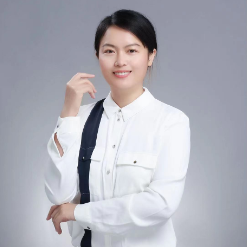

Email: [email protected]
Research Interests: Sparse representation, optimization methods, state estimation, image fusion and deblurring, Autonomous path planning, Intelligent behaviors in Unmanned Surface Systems.
Short Bio: Rui Gao is an Associate Professor in the Department of Naval Architecture and Ocean Engineering at Shanghai Jiao Tong University. She earned her Doctor of Science (Tech.) degree in Automation, Systems and Control Engineering from Aalto University, Finland, in 2020, and conducted postdoctoral research at the University of Cambridge, UK, in 2021. She has been selected for the Shanghai Overseas High-Level Leading Talents Program and the Pujiang Talents Program. Her research focuses on the innovative application of artificial intelligence algorithms in marine unmanned systems.


Email: [email protected]
Research Interests: Ontologies, computational intelligence, robotics, industrial automation, computer vision, and in particular visual servo control of robots.
Short Bio: Paulo J.S. Gonçalves is an Associate Professor (Professor Coordenador) of Electrotechnical and Industrial Engineering with the School of Technology in the Polytechnic Institute of Castelo Branco, Portugal. He is also a researcher at IDMEC, Center of Intelligent Systems (CSI).
Dr. Sequeira Gonçalves was trained in Mechanical Engineering, achieving the Licenciatura degree in 1995. He earned the M.Sc. and Ph.D. degrees from Instituto Superior Técnico, Universidade de Lisboa, 1998 and 2005, respectively.
Dr. Paulo Gonçalves (P.J.S. Gonçalves) presented more than 100 contributions in robotics, vision and computational intelligence.

Email: [email protected]
Research Interests: Intelligent Robotics ( Soft Robotics, Industrial Robotics, Vision); Computer-Aided Design, Computer Graphics
Short Bio: Jituo Li is currently an associate professor of the School of Mechanical Engineering, Zhejiang University, China. He is also with Zhejiang University Robotics Institute. He was an assistant professor of the Institute of Automation, Chinese Academy of Sciences. He is or was the PI of several projects of NSFC(Natural Science Foundation of China), National Key R&D Program of China, BNSF(Beijing Natural Science Foundation), ZPNSF (Zhejiang Provincial Natural Science Foundation of China),etc.


Email: [email protected]
Research Interests: Artificial Intelligence, Robotics, Ethics of Artificial Intelligence, Human Rights
Short Bio: Edson Prestes is Full Professor at Institute of Informatics of the Federal University of Rio Grande do Sul, Brazil. He is leader of the Phi Robotics Research Group and CNPq Research Fellow. He received his BSc in Computer Science from the Federal University of Pará (1996), Amazon, Brazil, and MSc (1999) and PhD (2003) in Computer Science from Federal University of Rio Grande do Sul, Brazil. Edson is Senior Member of the IEEE Robotics and Automation Society (IEEE RAS) and IEEE Standards Association (IEEE SA), and Member of Association for Computing Machinery (ACM).
Throughout his career, Edson has worked on several initiatives related to Standardization, Robotics, Artificial Intelligence and Ethics of Artificial Intelligence in Academia, Industry, International and Multilateral Organizations. For instance, Edson is Member of the Global Commission on Responsible Artificial Intelligence in the Military Domain; South America Ambassador at IEEE TechEthics; Chair of the IEEE RAS/SA 7007 - Ontologies for Ethically Driven Robotics and Automation Systems Standardization Working Group; Vice-Chair of the IEEE RAS/SA Ontologies for Robotics and Automation Standardization Working Group; Member of the ACM Global Technology Policy Council; Former Member of the United Nations Secretary-General’s High-level Panel on Digital Cooperation; Former Member of the UNESCO Ad Hoc Expert Group (AHEG) for the Recommendation on the Ethics of Artificial Intelligence and Former Member of the Global Future Council on the Future of Artificial Intelligence and of the G20 Digital Agenda Working Group at World Economic Forum. Additional information can be found at www.inf.ufrgs.br/~prestes/ or https://www.linkedin.com/in/edson-prestes/.
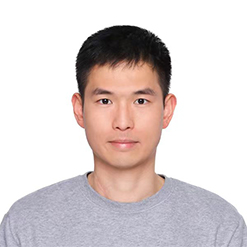
Email: [email protected]
Research Interests: Brain–computer interface technologies, deep learning, brain signal analysis, graph-based methods.
Short Bio: He received his Ph.D. from Fudan University in 2021 and subsequently conducted postdoctoral research there from 2021 to 2024. He is currently a Postdoctoral Researcher in the Department of Electrical and Computer Engineering at the University of Washington. His research focuses on advanced computational methods for brain signal analysis, with applications in brain–computer interfaces and related intelligent systems.
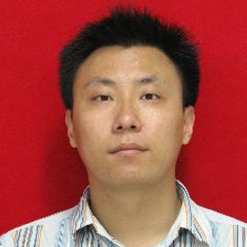
Email: [email protected]
Research Interests: Robot technology and application, computer-aided design and computer graphics, machine vision and image processing, product digital creative design method, etc.
Short Bio: Wang Jin, male, born in 1980, is a professor of Zhejiang University, an assistant dean of the Institute of Robotics, Zhejiang University, and the third level of 151 Talents Project in Zhejiang. He is mainly engaged in industrial robots and automation, new mechanism design theory and method, digital prototype and Simulation of complex equipment, digital design of products and other research work. He has participated in more than 30 projects such as the National Natural Science Foundation, the 863 Program, the National Science and Technology Support Program, and the entrustment of enterprises. He has published more than 50 papers in important academic journals in domestic and foreign country, has more than 30 patents, authorized more than 20, and won the Hangzhou Science and Technology Progress Award, the Geneva International Invention Gold Award and some other awards.
Research fields: robot technology and applications (industrial robots, service robots, educational robots, etc; computer aided design and computer graphics, machine vision and image processing, digital creative design method of products, etc.)
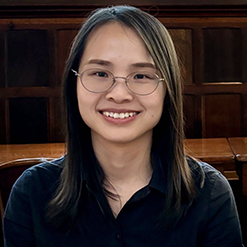

Email: [email protected]
Research Interests: Autonomous agents and multi-agent systems, Human-robot collaboration, Task and motion planning, Planning under uncertainty, Control systems, Intelligent robotics, Computational logic and formal languages, Artificial intelligence, Machine learning, Mixed initiative and human-in-the-loop
Short Bio: Pian Yu is a Lecturer (Assistant Professor) in Robotics & AI at Department of Computer Science, University College London (UCL). Prior to this position, she was a Postdoctoral Researcher at Department of Computer Science, University of Oxford and a Postdoctoral Researcher at EECS, KTH Royal Institute of Technology. She received her PhD in Electrical Engineering from KTH Royal Institute of Technology in Feb. 2021. She was a Student Best Paper Award finalist at the 2020 American Control Conference in Denver. She was selected as a Future Digileader by Digital Futures, Sweden in 2023 and a DAAD AInet fellow, Germany in 2023.
